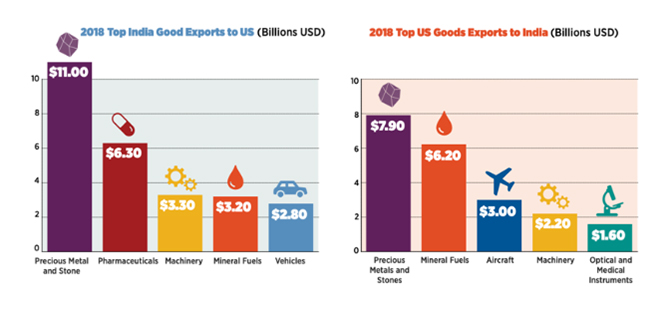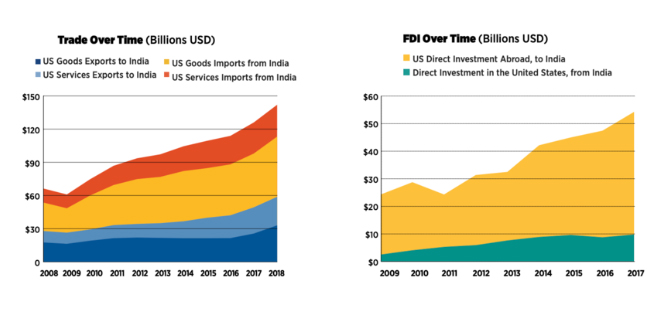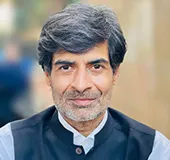
WEF: How do you see current trade tensions affecting the long-term relationship between the U.S. and India?
Samir Saran: These trade tensions are a manifestation of a bilateral relationship that is maturing in the midst of several interrelated structural transformations in the world order. Two interconnected transformations are particularly relevant to friction in the trade relationship: first, the digitalisation of the global economy and second, the politics of ‘techno-nationalism’.
Around the world, there is disagreement over the governance of data and the role of technology in development and security. Countries are used to conceding sovereign power over the course of decades, through long and hardened negotiations on say, trade and migration.
The explosion of digital platforms has pulled the rug from beneath governments: it has taken away their agency over their populations and businesses overnight
India is no different: one only need look at New Delhi’s gradual embrace of liberal internationalism since 1947. But the explosion of digital platforms has pulled the rug from beneath governments: it has taken away their agency over their populations and businesses overnight.
It would be naive to think that a government of over a billion people will cede the management of its democracy and its all-important services sector to technology companies half way across the world.
This is why data localization, e-commerce, mutual legal assistance, and data protection are the most contested issues between the U.S. and India.
 Image: Trade At A Crossroads: A Vision for the US–India Trade Relationship, Atlantic Council
Image: Trade At A Crossroads: A Vision for the US–India Trade Relationship, Atlantic Council
Both countries are routinely termed "natural allies", but few acknowledge the fact that the maturation of the democratic system in India as well as the expansion of its economy will follow a trajectory different from that of the United States. Rather than viewing ongoing negotiations as part of a process of self-discovery, as it is of self-preservation, the strategic and business communities in the U.S. and India have been talking past each other.
At issue is a fundamental disagreement about how digital technologies will shape our societies. In the United States, there is a firm belief that Silicon Valley can create value in developing economies like India while protecting human rights and cybersecurity.
The Indian perspective is dramatically different. There is a sense that Indian industry and governance propositions must manage the development and deployment of emerging technologies. The assumption that U.S. firms are able to protect the economic rights and civil liberties of Indian users better than its own government has been proven wrong by some recent events and developments.
 Image: Trade At A Crossroads: A Vision for the US–India Trade Relationship, Atlantic Council
Image: Trade At A Crossroads: A Vision for the US–India Trade Relationship, Atlantic Council
While both states have done well in keeping these tensions from affecting the broader bilateral relationship, the question of the digital economy will only continue to get larger and more consequential.
It is incumbent on the United States to acknowledge that cross-border data flows cannot be seen as an isolated issue – as they must be discussed in the broader context of national growth and development in the Fourth Industrial Revolution. India, meanwhile, must articulate its policy preferences clearly and quickly – to begin with it must identify sectors and operations in the digital economy where the market can operate without being worried about arbitrary or capricious policies.
There is currently considerable confusion amongst American lawmakers and businesses – as well as stakeholders across the international community – about India’s digital regime. India has dodged the question of data governance at the WTO, at the G20, and at trade negotiations like the Regional Comprehensive Economic Partnership.
The global digital economy will take shape without India if Delhi cannot make up its mind.
WEF: As the United States looks to impose stronger sanctions on Iran, what are the implications for India, Iran’s second-largest consumer of oil?
SS: In failing to exempt India from its sanctions regime, the United States is, unfortunately, pursuing short-term interests over long-term gain. It is essential to understand that energy trade between India and Iran is only one aspect of a far more crucial trend: the gradual merger of the Asian and European continents that is underway and is largely being effected by one player: China. At the moment, Eurasia is being defined primarily by China’s geo-economic thrust through its Belt and Road Initiative and the attendant politics riding on Beijing’s tracks and roads.
The ‘Eurasian’ supercontinent is fast emerging as the second geography influencing the future world order alongside the Indo-Pacific maritime system. Trade, infrastructure, energy, migration and security interests are all at play here and rules and frameworks that emerge will infect the entire global system. India must remain relevant in this emergence and its partnerships with Iran, Russia and others in the region will be crucial.
Different approaches to the digital economy are likely to grow and become more significant.
This interview originally appeared in World Economic Forum
The views expressed above belong to the author(s). ORF research and analyses now available on Telegram! Click here to access our curated content — blogs, longforms and interviews.




 Image: Trade At A Crossroads: A Vision for the US–India Trade Relationship, Atlantic Council
Image: Trade At A Crossroads: A Vision for the US–India Trade Relationship, Atlantic Council Image: Trade At A Crossroads: A Vision for the US–India Trade Relationship, Atlantic Council
Image: Trade At A Crossroads: A Vision for the US–India Trade Relationship, Atlantic Council PREV
PREV


